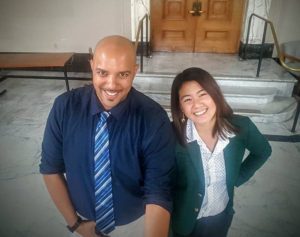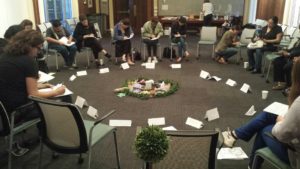Updated April 2019
Winners, 2017 Faces of Entrepreneurship Award 
How do you turn a deep-seated passion for peace, justice and community engagement into a living? This is the question Tyrone Botelho, 31, and Tiffany Hoang, 26, were asking themselves in 2014, huddled over a computer and educational materials in Botelho’s rented room in Oakland.
The two former Peace and Conflict Studies majors at the University of California, Berkeley, hit it off during a restorative justice training session Tyrone was helping run and Tiffany was attending. They were desperately trying to find a way to earn a living while promoting and maintaining their ideals.
Help came from an unlikely source – Tyrone’s landlord, Robin Nasatir, who just happened to be the program director for Youth Business USA (YBUSA), an organization dedicated to helping young entrepreneurs succeed.
“It was almost magical,” said Tyrone. He and Tiffany admit that initially they were completely lost when it came to the business side of things. “We didn’t even know what a business model was.”
An idea comes to life
With help from YBUSA, the ambitious duo learned to put together business plans, create budgets, plan strategies, and submit proposals. All to start and maintain a business – Circle Up Education. What’s more, they received access to a network of fellow entrepreneurs to call on for advice and support.
In 2014, they made just $1,900, but the next year they brought in $94,000. Thanks to a real demand for their workshops and consulting services, revenue grew to $590,000 for 2018. This year they are projecting to hit $1 million. They’ve worked with the City of Oakland and Fremont Unified School District. Many of their new clients are tech-based companies looking for diversity and inclusion support.
Tiffany says a huge part of the challenge was the unexpected emotional toll of being start-up business owner. Without the steadfast support of a mentor like Nasatir, the two may never have been able to make it.
Believing in us is the biggest thing she’s given us.
Tiffany Hoang
Life experiences
The daughter of Vietnamese immigrants, Tiffany’s family wanted her to be a successful doctor or engineer. But, largely because of her parents’ experiences as refugees and immigrants, she gravitated to justice and diversity issues.

Tyrone, on the other hand, went through 14 foster homes before aging out of the system. He believes his early life struggles gave him the extra drive to help others by working to create healthy, diverse communities where each person is a vital, respected stakeholder.
Circle Up Education provides clients with tools for inclusivity and relationship building, diversity and equity, and conflict resolution. The goal is to make businesses, communities, schools and cities thrive.
They’ve grown and thrived by tailoring programs to each client’s needs. They also focus on interactive activities and conversations instead of lectures and presentations. Since launching in 2014, they’ve slowly been making their work more expansive. They’ve developed teams within the organizations and looking at systems and structures in order to build capacity, change the culture, and create long-lasting institutional change.
Success and diversification
When they first started, Circle Up Education relied mainly on consultants. Now, thanks to the increase in revenue and contracts, they have two full-time employees. They also plan to turn one of their consultants into a part-time employee in the next two months. Not only that – they’ve also expanded geographically, taking on clients north, south, and east of the Bay Area.
Their current plans include launching community-based trainings as well as making their content available online.
I think there’s a really strong need for different types of training, especially around restorative practices and restorative justice. We’ve already started collecting a lot of training footage so we can incorporate that and make it engaging and interactive online.
Tiffany Hoang
Demand for their workshops has been so high, that up until last August they acquired clients mostly by word-of-mouth. But now that they plan to go bigger, they are ramping up their marketing efforts. It’s hard work, but worth it.
After a 70 or 80-hour work week I just want to sleep. Then I remember the smiles on people’s faces.
Tyrone Botelho
